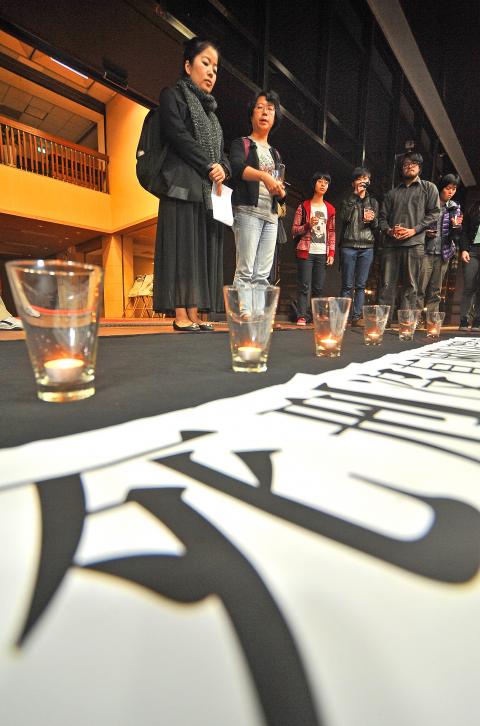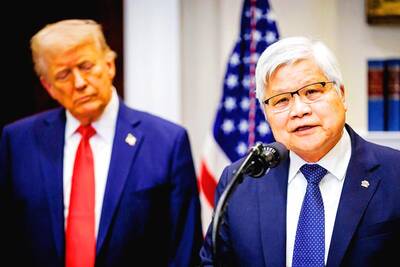Six convicts on death row were executed yesterday, the Ministry of Justice announced last night.
The executions were carried out a day after Minister of Justice Tseng Yung-fu (曾勇夫) signed orders giving the final go-ahead to carry out the death sentences given to the six individuals.
Tseng Si-ru (曾思儒) and Hung Ming-tsung (洪明聰) were executed in Taipei Prison; Chen Chin-huo (陳金火) and Kwang Teh-chiang (廣德強) in Greater Taichung Prison; Huang Hsien-cheng (黃賢正) in Greater Tainan Prison; and Tai Te-ying (戴德穎) in Greater Kaohsiung Prison, Deputy Minister of Justice Chen Shou-huang (陳守煌) told a press conference.

Photo: Liu Hsin-de, Taipei Times
Chen Shou-huang said the six who were executed had murdered women or children using very cruel methods, including setting fire to a home that killed innocent lives.
Chen Chin-huo and Kwang were sentenced to death for killing a female insurance agent and chopping up and eating parts of her body in 2004 in then-Taichung County.
Tseng Si-ru, a former Taipei County senior-high school teacher, was convicted of killing a female colleague after she caught him burgling her home in 2002.
Hung set fire to the home of in-laws, killing his brother-in-law and his brother-in-law’s three children in 2003 in then-Taipei County.
Tai killed his girlfriend’s father by stabbing him 26 times and severely wounded his girlfriend’s mother in 2006 in Kaohsiung.
Huang, who served a prison term for killing his ex-wife, murdered two other men five days after he was released on parole in 2005.
According to the ministry, Chen Chin-huo, Tai and Tseng Si-ru had signed documents donating their organs, but Tai was a hepatitis B carrier and Tseng Si-ru retracted his promise at the last minute. Only Chen Chin-huo’s organs were used.
Tseng Yung-fu, who took office in 2010, resumed capital punishment in Taiwan after a moratorium of more than four years. Since then, the minister has signed nine execution orders, not including the orders for the latest six. With yesterday’s executions, the number of death row inmates now stands at 55, according to the ministry.
Chen Shou-huang said there are still a number of countries that carry out capital punishment, including Japan and most Asian countries.
Various surveys over the years also show support for the death penalty in Taiwan. In a survey by the ministry released in July, 76.7 percent of respondents supported the death penalty.
Late last night, members of the Taiwan Alliance to End the Death Penalty held a demonstration in front of the ministry to protest the executions.
They lit up and placed six candles representing the six prisoners who were executed on a piece of black cloth and waved a white banner that read: “Capital punishment has not achieved the effect of stopping crime.”
Capital punishment is the cheapest method, but also the least effective, in stopping crime, alliance executive director Lin Hsin-yi (林欣怡) said.
If the government really wanted to put a stop to crime, it should not look to capital punishment as the cure; instead, it should strive to quickly and efficiently solve crimes and mete out appropriate punishments, Lin said.
Only then would there be an effective deterrent to crime, Lin said.
Additional reporting by CNA and staff writer

ENDEAVOR MANTA: The ship is programmed to automatically return to its designated home port and would self-destruct if seized by another party The Endeavor Manta, Taiwan’s first military-specification uncrewed surface vehicle (USV) tailor-made to operate in the Taiwan Strait in a bid to bolster the nation’s asymmetric combat capabilities made its first appearance at Kaohsiung’s Singda Harbor yesterday. Taking inspiration from Ukraine’s navy, which is using USVs to force Russia’s Black Sea fleet to take shelter within its own ports, CSBC Taiwan (台灣國際造船) established a research and development unit on USVs last year, CSBC chairman Huang Cheng-hung (黃正弘) said. With the exception of the satellite guidance system and the outboard motors — which were purchased from foreign companies that were not affiliated with Chinese-funded

PERMIT REVOKED: The influencer at a news conference said the National Immigration Agency was infringing on human rights and persecuting Chinese spouses Chinese influencer “Yaya in Taiwan” (亞亞在台灣) yesterday evening voluntarily left Taiwan, despite saying yesterday morning that she had “no intention” of leaving after her residence permit was revoked over her comments on Taiwan being “unified” with China by military force. The Ministry of the Interior yesterday had said that it could forcibly deport the influencer at midnight, but was considering taking a more flexible approach and beginning procedures this morning. The influencer, whose given name is Liu Zhenya (劉振亞), departed on a 8:45pm flight from Taipei International Airport (Songshan airport) to Fuzhou, China. Liu held a news conference at the airport at 7pm,

KAOHSIUNG CEREMONY: The contract chipmaker is planning to build 5 fabs in the southern city to gradually expand its 2-nanometer chip capacity Taiwan Semiconductor Manufacturing Co (TSMC, 台積電), the world’s biggest contract chipmaker, yesterday confirmed that it plans to hold a ceremony on March 31 to unveil a capacity expansion plan for its most advanced 2-nanometer chips in Kaohsiung, demonstrating its commitment to further investment at home. The ceremony is to be hosted by TSMC cochief operating officer Y.P. Chyn (秦永沛). It did not disclose whether Premier Cho Jung-tai (卓榮泰) and high-ranking government officials would attend the ceremony. More details are to be released next week, it said. The chipmaker’s latest move came after its announcement earlier this month of an additional US$100 billion

Authorities yesterday elaborated on the rules governing Employment Gold Cards after a US cardholder was barred from entering Taiwan for six years after working without a permit during a 2023 visit. American YouTuber LeLe Farley was barred after already being approved for an Employment Gold Card, he said in a video published on his channel on Saturday. Farley, who has more than 420,000 subscribers on his YouTube channel, was approved for his Gold Card last month, but was told at a check-in counter at the Los Angeles International Airport that he could not enter Taiwan. That was because he previously participated in two